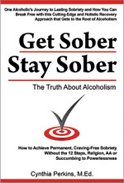Ten Warning Signs of Alcoholism
There are a lot more than ten warning signs of alcoholism, however these are some of the most common.
Alcoholism is a sneaky disease; the signs and symptoms often show up long before someone is aware they have a problem.
Many of the early stage signs are overlooked or minimized, until the elephant in the living room becomes so large it can no longer be denied.
Unfortunately, each of the signs in this list are an indication that alcohol addiction has already progressed to either a middle or late stage of alcoholism.
- Increased consumption. Alcoholism is a disease which like other chemical dependencies typically requires an increase in consumption to have the same physical effect. One drink after work can often progress into six drinks before lunch. An after work drink turning into two or three and weekend consumption bleeding into the workweek is a definite warning sign. Eventually there is an inability to stop or reduce consumption of alcohol even if they want to.
- Drinking for release. Drinking to escape, to relieve stress, to deal with anger, fear, sadness or emotional pain is a common warning sign of alcoholism and dependency.
- Drinking alone. Often what starts out as a social habit, drinking with friends or co-workers, turns into a dependency. Social drinking turns into altered brain chemistry and results in the need to drink more and more often resulting in drinking alone to avoid social stigma, guilt, and to simply satisfy a need for alcohol.
- Lying about consumption. As dependency increases, so too does the amount of alcohol a person drinks. The number of drinks can reach staggering levels, levels which are tough to admit to friends and family.
- Guilt. People suffering from alcoholism often feel guilt about the number of drinks they have, their dependency, and the effects the alcohol is having on their life. Effects can include mood swings, irresponsible behavior, driving while intoxicated, and problems at work, home or with the law.
- Losing track. As the chemical makeup of an alcoholic’s brain changes, the need for more alcohol increases. This often leads to memory loss and blackouts, where the events, activities and behaviors of hours and even days can be forgotten. This is a hallmark in the ten warning signs of alcoholism.
- Defensive and angry. People dealing with alcoholism often feel angry or resentful toward the disease they feel taking over their lives. They may feel angry because they feel defenseless or their anger may be an underlying trigger of their desire to drink and the alcohol releases inhibitions which enables them to express these buried emotions. Additionally, they often get angry and defensive when they are questioned about their drinking behaviors.
- Drinking early in the day. Another hallmark in the ten warning signs of alcoholism is drinking in the morning, particularly if it is to relieve hangover symptoms from the previous night or to address increasing cravings for alcohol. If a person wakes in the morning craving alcohol it’s past time to take action.
- Physical cravings. A need for alcohol will take over an alcoholic’s life. They won't be able to function without alcohol in their system and the need for alcohol will continue to increase until they're drinking during all hours of the day to keep their altered brain chemistry constant.
- Bleeding into all areas of life. Alcoholism affects the personal life of alcoholics, it affects their career, their finances, and every area of their life. In fact, Alcoholism costs Americans approximately 100 billion annually from loss in production, health and medical care, motor vehicle accidents, violent crime and social service programs.
We can also extend the ten warning signs of alcoholism to include trembling hands in the morning, making excuses to drink, violence or aggressive behavior when drinking, poor eating habits, nausea, vomiting, neglecting physical appearance and daily responsibilities and frequent conflict with family, friends, employers and the law.
According to the National Institute on Alcohol Abuse and Alcoholism Analysis, more than 18% of Americans experience alcohol abuse or alcohol dependence at some time in their lives. Unfortunately, the alcoholic is often not able to recognize the symptoms and signs of alcoholism in themselves,or if they do, it is minimized and rationalized. Alcoholism is often identified first by family, friends and loved ones.
Recognizing not only the ten warning signs of alcoholism, but the whole scope of symptoms involved can help you or a loved one understand the impact that alcohol has on one's life and motivate you to seek help. The more signs and symptoms an alcoholic exhibits the more damage that is done to the body and brain chemistry, and the more damage that is done, the harder the road is in recovery. So, the sooner one begins the recovery process, the better, however, it is never too late.
Return from ten warning signs of alcoholism back to physical symptoms


